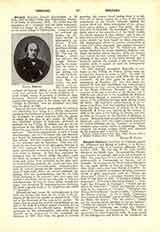

Bernard Guidons, Inquisitor of Toulouse against the Albigenses and Bishop of Leave, b. at Royeres (Limousin) in 1261; d. at Lauroux (Herault), December 30, 1331. He was one of the most prolific writers of the Middle Ages. He entered the Dominican Convent at Limoges, and made his profession in 1280. Ten years later he was made Prior of Albi, and subsequently at Carcassonne, at Castres, and at Limoges. In recompense for his services as Inquisitor he was made Bishop of Tuy in Galicia, by Pope John XXII, and a year later Bishop of Lodeve. In spite of his manifold occupations he wrote numerous works of great importance such as: “Fleurs des chroniques”, which is a universal chronicle from the time of Our Lord to 1331; “Chronique abregee des empereurs”, “Chronique des rois de France“, “Catalogue des Eveques de Limoges”, “Traite sur les saints du Limousin”, “Traite sur l’histoire de l’abbaye de St. Augustin de Limoges”, “Chronique des Prieurs de Grandmont” (as far as 1318),” “Chronique des Prieurs d’Artige” (as far as 1313), “Chronique des eveques de Toulouse” (as far as 1327), “Sanctoral ou Miroir des saints”, “Vie des saints”, “Traite sur les soixante-douze disciples et sur les apotres”, “Traite sur l’epoque de la celebration des conciles”, “Compilation historique sur l’ordre des Dominicains”, “Pratique de l’inquisition”. This last is practically his most important work. It is an expose of the prerogatives and duties of the inquisitor: its citations, its forms of condemnation, its instructions for examinations, constitute a unique document for the study of the Inquisition during the first period of its existence. This work, lost for a time, was published later in extenso by l’abbe Douais, “Practica Inquisitionis ha?reticae pravitatis, auctore Bernardo Guidonis (Toulouse, 1886). Bernard is also the author of a number of theological treatises; “Abrege de la doctrine chretienne”, “Traite de la messe”, “Traite sur la conception de la Vierge”, and also of different sermons.
M. DE MOREIRA

